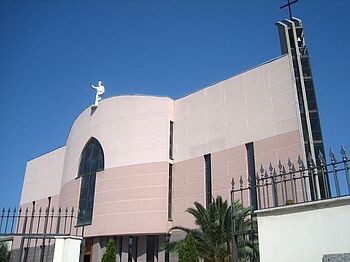The communist regime in Albania distinguished between people with "good" and people with "bad" biographies. For this reason, it often had entire families arrested or interned. Today, however, few people are concerned about safeguarding their memories. The Institute for Studies on Communist Crimes and Consequences (ISKK) has conducted numerous interviews with contemporary witnesses.
“My first prison was a lavatory”

Credit: Gertjan R.
The Catholic St. Paul's Cathedral in Tirana is just 20 years old. Many older church buildings were destroyed in Albania during the communist dictatorship. Paul the Apostle is said to have founded one of the first Christian communities in Europe here. The Catholic Church was especially targeted for persecution because of its cross-border hierarchical structures. Only a few priests survived Albanian communism. One of them was Father Anton Luli, who was imprisoned for more than 40 years.
I had just been ordained priest when in my country Albania the communist dictatorship came to power bringing with it the fiercest religious persecution. Some of my brothers in faith, following a trial which was full of falsehood and deceit were executed and died martyrs to the faith. They celebrated in this manner, as broken bread and blood their last personal Eucharist, were executed by a firing squad and died martyrs to their faith. It was 1946
Instead the Lord asked me to live, opening my arms and leaving me nailed to a cross, celebrating in this way the priestly ministry denied to me and in the life spent in chains and torture of every sort, my Eucharist, my priestly offering.
I was arrested on the 19th December 1947 with the accusation of action and propaganda against the government. I was imprisoned for 17 years and spent many other years in forced labour. My first prison was a lavatory located in a mountain village near Scutari. It was the month of December and freezing. I stayed there for nine months forced to squat over hardened feces and without ever being able to lie down given the lack of space.
On Christmas eve of that year ( how could I forget? ) they moved me from there and took me to another lavatory on the second floor, made me undress and hung me from a cord passing under my arm pits. I was naked and could touch the ground only with the tips of my toes. I could feel my body give way slowly, relentlessly. The cold slowly rose from my body and when it was about to reach my heart I let out a desperate cry.
My jailors came at once, took me down and kicked me around all over my body. That night, in that place and in the solitude of my first agony, I witnessed the real sense of the Incarnation and of the Cross. All through my suffering I felt near me and within me the comforting presence of Our Lord Jesus. I cannot but call it ‘extraordinary’, such was the joy and consolation that He communicated to me.
But I have never felt any rancour for those who, humanly speaking, stole my life from me. After being freed one day by chance I met one of my torturers in the street. I felt compassion and expressed it by going towards him and hugging him.
They freed me during the Amnesty of 1989. I was seventy nine years old.
Click here for Anton Luli’s entire testimony.
Links
Website of the Institute for the Study of Communist Crimes and Consequences (English and Albanian)
Documentary on prisons in Albania
After the Dictatorship. Instruments of Transitional Justice in Former Authoritarian Systems – An International Comparison
A project at the Department of Modern History at the University of Würzburg
Twitter: @afterdictatorship
Instagram: After the dictatorship
With financial support from the German Federal Ministry for Economic Cooperation and Development
"All the artists had become agents"
![[Translate to Englisch:] The Building with cubes](/fileadmin/_processed_/0/8/csm__The_Building_with_Cubes__bea_e4f40dc8c0.jpg)
Credit: JoraK
Overly modern instead of socialist-realist – that was the verdict on this building in Tirana designed by Albanian architect Maks Velo in 1972. A year later he was banished to a village and arrested in 1978. Charged with “agitation and propaganda," he was sentenced by a court to ten years in a prison and forced labor in the Spaç camp. By the time he was released in 1986, the secret police had tried to recruit him six times – without success. He described his persecution in 2019.
That world was horrible, a nightmare! I tried to resist, I managed to resist. My resistance was to the point of not being defeated, as I was asked six times to cooperate with the Sigurimi. [...]
I’ve been in prison for seven years, three months and ten days, alongside the investigation. At the time of the arrest, 246 artworks were taken from me, and all those were burnt. [...] The damage is irreparable for an artist who has a deep connection to his artwork, it’s just like giving up a piece of human life, a piece of life but the problem is that the people are not rehabilitating that quickly.
I sent a request to the Authority for Information on Former State Security Documents. They worked long hours and handed over about 120 papers: All the secret files, relationships, conversations with the Albanian League of Writers and Artists [ALWA], the links between the Ministry of Interior with the Artists’ League. The denunciations by artists, which are a lot, there were people I couldn’t even imagine. All the artists, decorated by the state as “Artists of the people”, “Deserving Artists”, had become ordinary agents. In addition, I had been denounced by neighbours as well; the file contained all the denunciations they had made against me constantly for 30 years. How the Sigurimi operated, how they had followed me for entire days. The whole story was there in the file. If you read it, you understand the whole story of man’s persecution in communist times.